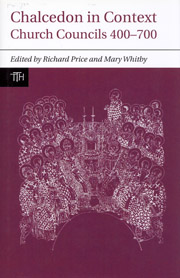Book contents
- Frontmatter
- Contents
- Abbreviations
- List of Contributors
- Introduction
- The Council of Chalcedon and the Definition of Christian Tradition
- ‘Reading’ the First Council of Ephesus (431)
- The Syriac Acts of the Second Council of Ephesus (449)
- The Council of Chalcedon (451): A Narrative
- Truth, Omission, and Fiction in the Acts of Chalcedon
- Why Did the Syrians reject the Council of Chalcedon?
- The Second Council of Constantinople (553) and the Malleable Past
- The Lateran Council of 649 as an Ecumenical Council
- The Quinisext Council (692) as a Continuation of Chalcedon
- Acclamations at the Council of Chalcedon
- An Unholy Crew? Bishops Behaving Badly at Church Councils
- Index
Why Did the Syrians reject the Council of Chalcedon?
- Frontmatter
- Contents
- Abbreviations
- List of Contributors
- Introduction
- The Council of Chalcedon and the Definition of Christian Tradition
- ‘Reading’ the First Council of Ephesus (431)
- The Syriac Acts of the Second Council of Ephesus (449)
- The Council of Chalcedon (451): A Narrative
- Truth, Omission, and Fiction in the Acts of Chalcedon
- Why Did the Syrians reject the Council of Chalcedon?
- The Second Council of Constantinople (553) and the Malleable Past
- The Lateran Council of 649 as an Ecumenical Council
- The Quinisext Council (692) as a Continuation of Chalcedon
- Acclamations at the Council of Chalcedon
- An Unholy Crew? Bishops Behaving Badly at Church Councils
- Index
Summary
After the deposition of Dioscorus of Alexandria at the Synod of Chalcedon, the ‘Oriental bishops and those with them’ are represented as exclaiming: ‘Many years to the senate! Holy God, Holy Strong, Holy Immortal, have mercy on us. Many years to the emperors! The impious are always routed; Christ has deposed Dioscorus.’ This is the earliest record of the Thrice-Holy Hymn, the Trisagion. It is not clear why the bishops of the diocese of Oriens thought it appropriate to exclaim it on this occasion. It is striking, however, that barely a quarter of a century later, the thrice-holy hymn, with the theopaschite addition (‘Holy God, Holy Strong, Holy Immortal, who was crucified for us, have mercy on us’) became popular in Antioch, as a chant encapsulating the rejection of the Chalcedonian Definition. For even though the controversy over the Trisagion was really a misunderstanding between a Trinitarian understanding of the hymn, found in Constantinople, in which the theopaschite addition implied the passibility of the divine nature, rejected on all sides, and a Christological understanding of the hymn, which affirmed that Christ suffered on the Cross, for the Syrians the theopaschite version of the Trisagion underlined what they believed to be the defect of Chalcedon, namely its failure to affirm with uncompromising clarity that through the Incarnation, God himself, the second person of the Trinity, assumed human nature and human experience, and in particular the human experience of death, in order to redeem humanity from the curse of death unleashed by the Fall of Adam.
Information
- Type
- Chapter
- Information
- Chalcedon in ContextChurch Councils 400-700, pp. 107 - 116Publisher: Liverpool University PressPrint publication year: 2011
Accessibility standard: Unknown
Why this information is here
This section outlines the accessibility features of this content - including support for screen readers, full keyboard navigation and high-contrast display options. This may not be relevant for you.Accessibility Information
- 1
- Cited by
